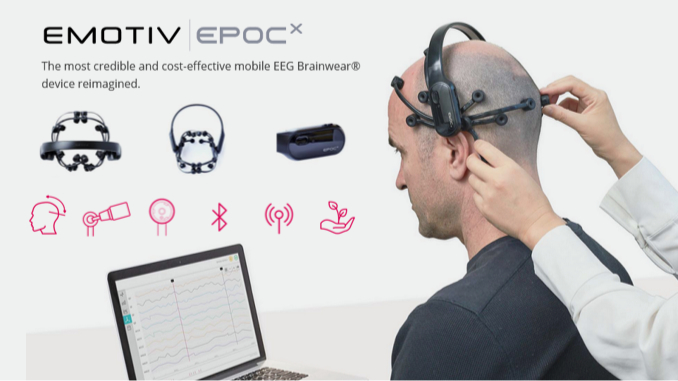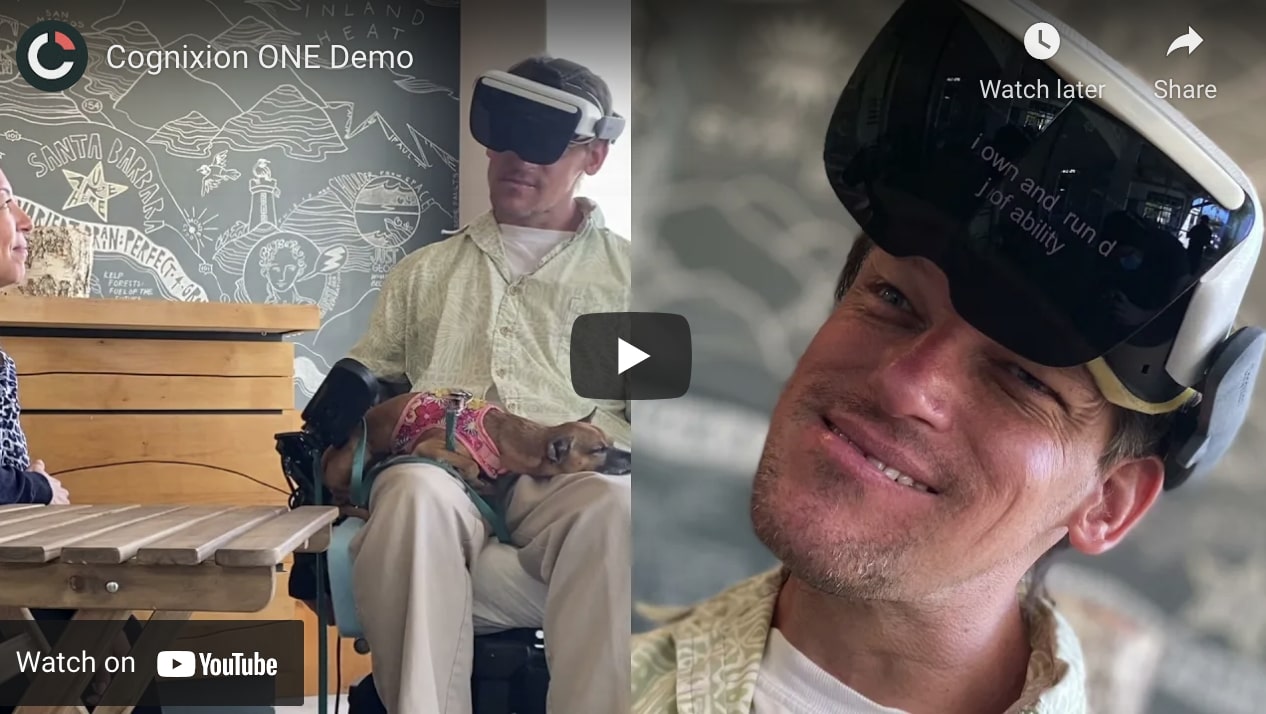
Neuralink, led by Elon Musk, has attracted the world's attention in the area of BCI (Brain-Computer Interface), which connects the brain to computers.The BCI they are offering is capable of capturing accurate and informative brain data by implanting an implant in the brain.
On the other hand, there is a non-invasive BCI that reads brain waves by mounting a device on the head without the need for surgery. Among the startups dealing with non-invasive BCI, there are many startups that have grown by combining other technologies and implementing them in society for various use cases and purposes. In this article, we will introduce five carefully selected non-invasive BCI startups that are gaining momentum right now.
1. Cognixion
Cognixion is a startup that offers the world's first wearable speech generation device that combines BCI and AR.
 Image: Cognixion Device
Image: Cognixion Device
The device offered by the company, "Cognixion One," is designed for people with speech disabilities. By manipulating the buttons projected on the AR device screen with your mind, the voice assistant will read out the characters you input as you wish.
It has three features: communication without delay, accuracy in reading thoughts, and simple design.
The first is the speed from thought to speech generation. By speeding up the processing of machine learning, which generally takes a certain amount of time, Cognixion One is able to achieve fast communication with fewer pauses. Secondly, the accuracy of reading thoughts. By using deep learning technology, they have been able to achieve 95% to 100% accuracy in reading thoughts. The third is the usability of the device. The simple and modern design, refined by many designers, provides users with smooth communication.
In addition to Cognixion One, the company also offers "Sparkprose," which supports conversation using eye and facial expressions. Cognixion is a start-up that offers many approaches to the challenge of communication.
| Industry | Artificial Intelligence, AR, Neuroscience |
| Headquarters | Santa Barbara, California, USA. |
| Founded Date | 2014 |
| Employees | 11-50 |
| Funding Status | Seed |
| Total Funding | $2.8M |
| Investors | 1 |
| Estimated Revenue | $1M or less |
Reference: Crunchbase Cognixion
2. Kernel
Kernel is a startup with a large amount of money, talented people, and technology that is second to none to Neuralink led by Elon Musk.
Founder Bryan Johnson is known as a serial entrepreneur. He founded Braintree, sold it to PayPal for 80 billion yen, and then launched a fund called OS Fund, and founded the company Kernel with his own funds in 2016.
Image: Kernel Device
The company has developed a helmet-type device Flow that uses fNIRS to measure brain activity based on the amount of oxygen in the blood, and a device Flux that uses MEG to capture changes in the magnetic field of the brain.
Although devices using MEG and fNIRS have appeared on the market, they have many disadvantages, such as limited data collection and a size too large to be placed only in facilities. The company, however, has made it possible to collect high-quality data at home by using its superior proprietary technology. The large number of rich data sets that were previously difficult to obtain will be a big step forward in this industry.
| Industry | Information system, Life science, Neuroscience |
| Headquarters | Los Angels, California, USA. |
| Founded Date | 2016 |
| Employees | 51-100 |
| Funding Status | Series C |
| Total Funding | $107M |
| Investors | 6 |
Reference: Crunchbase Kernel
3. Muse by Interaxon
Interaxon is a startup that uses BCI to help people improve their mindfulness meditation and sleep quality.
Muse, an EEG device provided by the company, can obtain real-time feedback on mental activity, heart rate, breathing, and body movements.
By wearing the device and installing a dedicated app, users can check their meditation and sleep quality in addition to their daily biometric data.
The most important feature of the device is its price. The company offers two types of devices, Muse 2 and Muse S, both of which can be purchased for $200 to $300. Because of its affordability, the number of users has been growing year after year, and the app has been downloaded less than 8,000 times a month.
Its use is not limited to mindfulness. The company also provides a system for developers to take real-time data of their own brain waves, which is also used by many researchers due to its price and development support. There is even a community called Muse research, where many university researchers use Muse for their research.
| Industry | Consumer Electronics, Fitness |
| Headquarters | Tronto, Ontario, Canada |
| Founded Date | 2007 |
| Employees | 11-50 |
| Funding Status | Series B |
| Total Funding | $30.4M |
| Investors | 14 |
Reference: Crunchbase Interaxon
4. Emotiv
Emotiv is a startup that offers a number of EEG devices and applications for research and development.
 Image: Emotiv Device
Image: Emotiv Device
The key point to note is the quality of the data and the platform provided: the device EPOC X, which has 14 electrodes, is designed to fit any head shape with its flexible and rotatable frame.
This allows the BCI to accurately capture data from the frontal, occipital, temporal, and parietal lobes, and because it is relatively inexpensive at $849, it is often used by researchers who deal with complex processes such as moving a cursor.
Even a beginner can create a BCI application once they buy the device. Aside from Emotiv Pro, a platform that can acquire raw brain wave data in real-time for researchers, the free platform Emotiv BCI allows you to create BCI applications, such as moving a drone with a thought, using already prepared algorithms at the touch of a button.
| Industry | Enterprise Software, Health Care |
| Headquarters | San Francisco, California, USA. |
| Founded Date | 2011 |
| Employees | 51-100 |
| Funding Status | Seed |
| Total Funding | $120K |
| Investors | 2 |
| Estimated Revenue | $1-10M |
Reference: Crunchbase Emotiv
5. Bitbrain
Bitbrain is a startup from Spain that is active in the collaborative development of BCI. The company provides a number of devices and software such as EEG devices and eye-tracking, and is also active in collaborative development and consulting with companies.
 Image: Bitbrain Device
Image: Bitbrain Device
Announced at CES in 2018, the company's collaboration with Nissan had the potential to revolutionize the automotive industry. It is generally known that when a person is about to perform an action, a specific brain wave response occurs 1~2 seconds before the actual action. In this project, the BCI is attached to the driver, and by detecting the brain wave response that occurs before a certain action, the system can predict the actual action and suggest a more comfortable and safer driving experience. Using this technology, it may be possible to predict and prevent unexpected traffic accidents before they happen.
| Industry | Biotechnology, Consumer Research |
| Headquarters | Zaragoza, Aragon, Spain. |
| Founded Date | 2010 |
| Employees | 11-50 |
| Funding Status | Private |
| Total Funding | $1.9M |
| Investors | 1 |
Reference: Crunchbase Bitbrain
Conclusion
In this article, we have introduced five neurotech startups that apply non-invasive BCI technology. Although each of them provides BCI using various forms and technologies, they have achieved growth by finding their own unique features and practicality. At the same time, the number of people who generally feel comfortable with the seemingly science-fiction-like technology of Neurotech is increasing day by day.
We can expect more non-invasive BCI startups to appear in the future, but there may be many opportunities to enter the market, thanks to pioneer startups like those introduced here, who have already pioneered the market.


